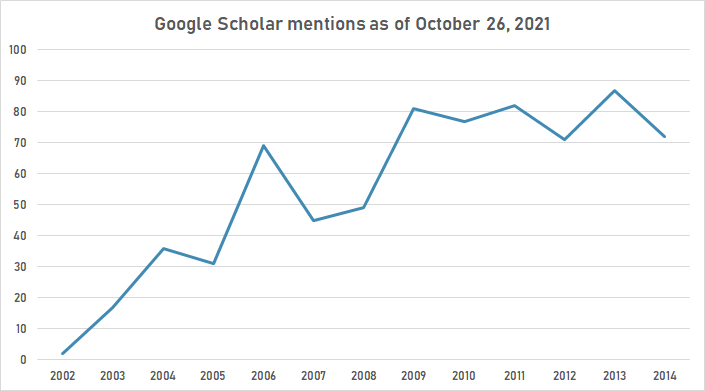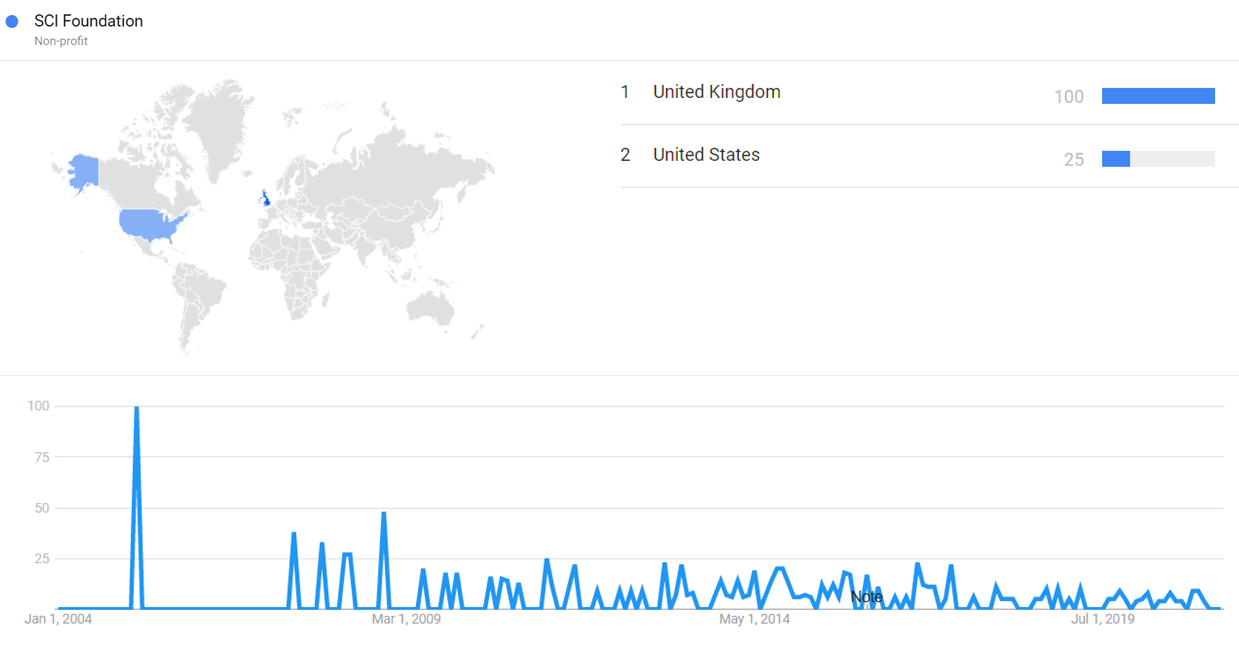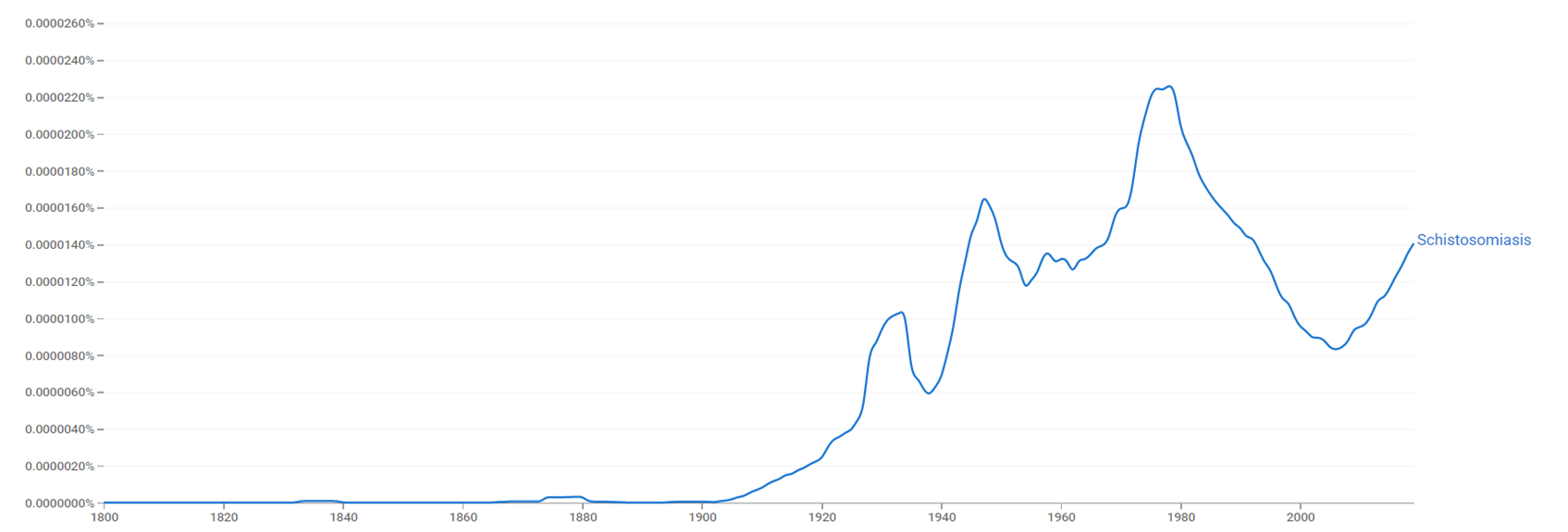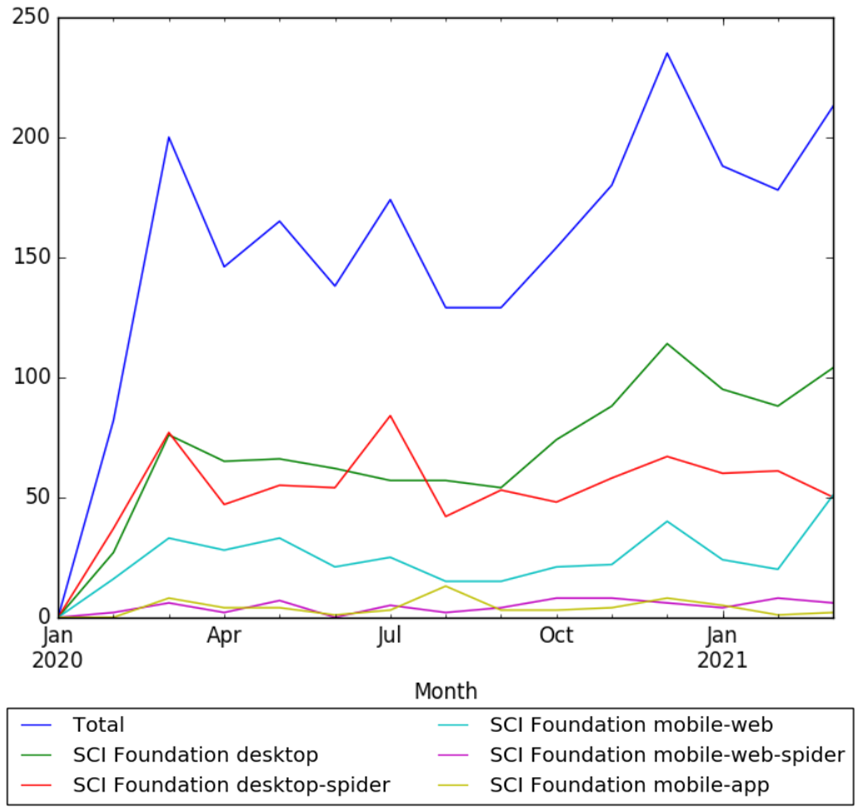Timeline of Schistosomiasis Control Initiative
This is a timeline of Schistosomiasis Control Initiative, a non-profit initiative that works with governments in sub-Saharan African countries to create or scale up programs that treat schistosomiasis and soil-transmitted helminthiasis.[1]
Big picture
| Time period | Development summary |
|---|---|
| 2006 | SCI becomes a founding partner of the Global Network for Neglected Tropical Diseases which promotes integration of control or elimination programmes against seven neglected tropical diseases. |
| 2007 | SCI facilitates delivery of approximately 40 million treatments of praziquantel against schistosomiasis, and many more deworming doses of albendazole.[2] |
| 2010 | SCI expands its reach after the award of the management of ICOSA, a programme funded by the Department for International Development (DFID).[2] |
| 2013 | SCI announces that it has facilitated delivery of its 100 millionth treatment of praziquantel against schistosomiasis thanks to funding from private donations.[2] |
| 2016 | SCI reaches an annual delivery of over 50 million treatments for schistosomiasis and soil-transmitted helminths.[2] |
| 2018 | SCI facilitates the delivery of its 200 millionth treatment against parasitic worm infections.[2] |
Full timeline
| Year | Month and date | Event type | Details | Location |
|---|---|---|---|---|
| 2002 | SCI is founded through a US$32 million grant from the Bill and Melinda Gates Foundation[1], to tackle schistosomiasis in sub-Saharan Africa, where infected people are unable to afford the drugs needed for treatment.[3][4] | |||
| 2002 | Expansion | SCI begins program in Uganda, the first operating country.[5] | Uganda | |
| 2003 | October | Program | SCI selects six countries for full support: Uganda, Burkina Faso, Niger, Mali, Tanzania, and Zambia. The countries each propose a different implementation approach and management structure for their large-scale schistosomiasis control.[6] | |
| 2003 | Expansion | SCI begins program in Zambia, Zanzibar, and Niger.[5][7][8][9] | Zambia, Zanzibar, Niger | |
| 2006 | Funding | SCI receives large grants from the United States Agency for International Development and the Bill & Melinda Gates Foundation to support integrated NTD programs in eight countries for five years to treat lymphatic filariasis, onchocerciasis, and trachoma, in addition to schistosomiasis and soil-transmitted helminths.[1] | ||
| 2007 | Funding | SCI receives a grant to expand its work to Rwanda and Burundi.[1] | ||
| 2007 | Expansion | SCI program starts in Burundi.[5] | Burundi | |
| 2008 | Organization | The Schistosomiasis Consortium for Operational Research and Evaluation (SCORE) is established to answer strategic questions about schistosomiasis control.[10] | ||
| 2009 | Review | GiveWell begins reviewing SCI.[11] | ||
| 2010 | Expansion | SCI begins working in Côte d'Ivoire.[1] | Côte d'Ivoire | |
| 2010 | October | Funding | SCI receives £10.5 million (plus separate funding for drugs) from the British Department for International Development for treating schistosomiasis and soil-transmitted helminthiasis in eight countries over five years.[12][1] | |
| 2010 | Statistics | The World Health Organization reports that schistosomiasis mortality could be as high as 280,000 per year in Africa alone.[13] | ||
| 2011 | April | Review | GiveWell publishes review of SCI, describing it as a notable organization for its promising approach and for conducting evaluations of its activities, and considering as an "organization to watch."[14] | |
| 2011 | November | Review | GiveWell updates review of SCI and starts recommending the organization.[15] This time, SCI is described as one of GiveWell's two top-rated charities.[16] | |
| 2011 | Expansion | SCI begins program in Liberia, Malawi, and Mozambique.[5] | Liberia, Malawi, Mozanbique | |
| 2012 | Expansion | SCI program starts in Côte d'Ivoire, two years later due to political turmoil.[1][5] | Côte d'Ivoire | |
| 2012 | Expansion | SCI begins conversations with the Government of Ethiopia about starting a national schistosomiasis treatment program.[1] | Ethiopia | |
| 2012 | Coverage | SCI reaches median coverage for schistosomiasis treatment at 77% in Malawi.[17] | ||
| 2012 | November | Review | GiveWell updates review of SCI, and recommends the organization for its focus on a program with a strong track record and excellent cost-effectiveness, demonstrated results, and room for more funding.[11] | |
| 2013 | April | Coverage | SCI announces that it has facilitated delivery of its 100 millionth treatment of praziquantel against schistosomiasis thanks to funding from private donations.[2] | |
| 2013 | Expansion | SCI begins first round of treatment in Ethiopia and Mauritania.[1][5][1][5] | Ethiopia, Mauritania | |
| 2013 | A reported 261 million people require preventive chemotherapy for schistosomiasis worldwide, 92% of them living in sub-Saharan Africa and only 12.7% receiving preventive chemotherapy.[13] | |||
| 2013 | November | Review | GiveWell updates review of SCI, maintaining its rating as a top-rated charity.[18] | |
| 2013 – 2014 | Between November 2013 and April 2014 | SCI funds mapping in Ethiopia.[1] | Ethiopia | |
| 2014 | June | Review | GiveWell updates review of SCI. It reports among notable plans a new opportunity to work with Sudan to create a national deworming program.[19] | Sudan |
| 2014 | Expansion | SCI begins program in the Democratic Republic of the Congo and Madagascar.[5] | Democratic Republic of the Congo, Madagascar | |
| 2014 | Collaboration | SCI begins working with other partners in Côte d'Ivoire, including Sightsavers, the END Fund, and Helen Keller International on a more integrated neglected tropical diseases (NTD) program.[1] | ||
| 2014 | Funding | The British Department for International Development awards SCI an additional £16.6 million over four and a half years (June 2014 to December 2018) to extend the program and expand it to an additional two countries.[1] | ||
| 2014 | Coverage | SCI reaches median coverage for schistosomiasis treatment at 69% in Malawi, 82% in Côte d'Ivoire, and 47% in Uganda.[17] | ||
| 2014 | November | Review | GiveWell updates review of SCI, maintaining its rating as a top-rated charity.[20] | |
| 2014 – 2015 | Coverage | SCI reports having delivered 3.1 million treatments in Côte d'Ivoire in the period.[1] | Côte d'Ivoire | |
| 2015 | Budget | SCI begins to use a system of country cashbooks for spending breakdown, which compare monthly in-country actual spending to budgets.[1] | ||
| 2015 | Coverage | SCI reaches median coverage for schistosomiasis treatment at 81% in Mozambique, 93% in Zambia (2015), and 80% in Zanzibar.[17] | ||
| 2015 | Schistosomiasis is indicated to have the lowest level of preventive chemotherapy implementation in the spectrum of neglected tropical diseases. It is also highlighted as the disease most lacking in progress.[13] | |||
| 2015 | August | Review | GiveWell updates review of SCI, and continues to recommend it for its track record implementing a cost-effective program.[21] | |
| 2015 | November | Review | GiveWell updates review of SCI, maintaining its rating as a top-rated charity.[22] | |
| 2015 – 2016 | Program | SCI plans to deliver around 0.6 million treatments and reports delivering 1.4 million treatments in Côte d'Ivoire.[1] | ||
| 2015 – 2016 | Between April 2015 and March 2016 | SCI spends around US$2.1 million in unrestricted funding and $0.8 million in restricted funding in Ethiopia during the period.[1] | Ethiopia | |
| 2015 – 2016 | Between April 2015 and March 2016 | Coverage | SCI reports having delivered 890,000 treatments in Uganda, out of 1.2 million planned treatments.[1] | |
| 2016 | Expansion | SCI begins program in Nigeria.[5] | Nigeria | |
| 2016 | January | Funding | Private foundation Good Ventures awards a grant of US$1,000,000 to the SCI for general operating support, in recognition of the organization’s earning a “top charity” ranking from GiveWell in 2015.[23] | |
| 2016 | June | Review | GiveWell publishes review of SCI, retaining its role as top rated charity, but expressing concerns about SCI's use of an accounting system ill-suited to its needs, and substantial financial errors impacting funding from GiveWell-influenced donors.[24] | |
| 2016 | August | Review | GiveWell estimates that programs supported by SCI can deworm a person for approximately US$1.26 based (including the estimated cost of SCI’s funding to country programs, SCI’s headquarters costs, cost of donated drugs, and local government involvement).[17] | |
| 2016 | November | Review | GiveWell reviews SCI and ranks it as one of its top-rated charities, explaining that it "offers donors an outstanding opportunity to accomplish good with their donations".[25] | |
| 2017 | January | Funding | Good Ventures awards a grant of US$13,500,000 to SCI for general operating support, in recognition of its earning a “top charity” ranking from GiveWell in 2016.[26] | |
| 2017 | October | Budget | SCI estimates that it would cost US$0.24 on average per additional treatment delivered to a school-aged child.[1] | |
| 2017 | November | Review | GiveWell updates review on SCI and estimates that it could productively use roughly US$30 million more than it expects to receive to deliver treatments to school-aged children over the next three years. It could use almost three times this amount if it were to follow World Health Organization guidelines, which recommend treating adults in certain circumstances. However, GiveWell does not recommend funding to treat adults because it has not seen sufficient evidence on the impact of treating adults.[27] | |
| 2017 | Budget | GiveWell allocates 100% of its discretionary fund to the SCI in the fourth quarter of the year, totalling US$5.6 million.[28] | ||
| 2018 | March | Funding | GiveWell allocates 100% of its discretionary fund to SCI, totalling US$5.6 million. It allocates a further $0.89 million to the SCI in the first quarter of 2018, which is 30% of its discretionary fund for that period.[28][29] | |
| 2018 | May | Funding | GiveWell allocates 30% of its US$3 million in discretionary fund to SCI.[29] | |
| 2018 | August | Funding | GiveWell allocates 30% of its US$4.1 million in discretionary fund to SCI.[29] | |
| 2018 | November | Funding | GiveWell recommends that Good Ventures grant $2.5 million to SCI,[30] which is recommended for its focus on a program with a strong track record and excellent cost-effectiveness, standout transparency, and room for more funding.[31] | |
| 2019 | March | Funding | GiveWell updates its estimate of SCI's room for more funding from US$16.8 million to $28.7 million as a result of incorporating SCI's updates to its projections for how much funding it expects to receive from other funders over the next few years.[1] |
Numerical and visual data
Google Scholar
The following table summarizes per-year mentions on Google Scholar as of October 26, 2021.
| Year | "Schistosomiasis Control Initiative" |
|---|---|
| 2002 | 2 |
| 2003 | 17 |
| 2004 | 36 |
| 2005 | 31 |
| 2006 | 69 |
| 2007 | 45 |
| 2008 | 49 |
| 2009 | 81 |
| 2010 | 77 |
| 2011 | 82 |
| 2012 | 71 |
| 2013 | 87 |
| 2014 | 72 |
| 2015 | 80 |
| 2016 | 84 |
| 2017 | 88 |
| 2018 | 63 |
| 2019 | 70 |
| 2020 | 73 |

Google Trends
The chart below shows Google Trends data for SCI Foundation (Non-profit), from January 2004 to April 2021, when the screenshot was taken. Interest is also ranked by country and displayed on world map.[32]

Google Ngram Viewer
The chart below shows Google Ngram Viewer data for Schistosomiasis, from 1800 to 2019.[33]

Wikipedia Views
The chart below shows pageviews of the English Wikipedia article SCI Foundation, from January 2020 to April 2021.[34]

Meta information on the timeline
How the timeline was built
The initial version of the timeline was written by User:Sebastian.
Funding information for this timeline is available.
Feedback and comments
Feedback for the timeline can be provided at the following places:
- FIXME
What the timeline is still missing
Timeline update strategy
See also
External links
References
- ↑ 1.00 1.01 1.02 1.03 1.04 1.05 1.06 1.07 1.08 1.09 1.10 1.11 1.12 1.13 1.14 1.15 1.16 1.17 1.18 1.19 "Schistosomiasis Control Initiative: Supplementary Information". givewell.org. Retrieved 11 March 2019.
- ↑ 2.0 2.1 2.2 2.3 2.4 2.5 "SCI". schistosomiasiscontrolinitiative.org. Retrieved 10 April 2019.
- ↑ "Ten million Africans treated by international disease treatment programme". imperial.ac.uk. Retrieved 12 March 2019.
- ↑ Adenowoa, Abiola Fatimah; Oyinloyea, Babatunji Emmanuel; Ogunyinkaa, Bolajoko Idiat; Kappo, Abidemi Paul. "Impact of human schistosomiasis in sub-Saharan Africa". Brazilian Journal of Infectious Diseases. doi:10.1016/j.bjid.2014.11.004.
- ↑ 5.0 5.1 5.2 5.3 5.4 5.5 5.6 5.7 5.8 "OUR REACH". schistosomiasiscontrolinitiative.org. Retrieved 12 March 2019.
- ↑ "Schistosomiasis Control Initiative (SCI) — 2015 Review, Updated April 2016". givewell.org. Retrieved 12 March 2019.
- ↑ "ZAMBIA". schistosomiasiscontrolinitiative.org. Retrieved 10 April 2019.
- ↑ "ZANZIBAR". schistosomiasiscontrolinitiative.org. Retrieved 10 April 2019.
- ↑ "NIGER". schistosomiasiscontrolinitiative.org. Retrieved 10 April 2019.
- ↑ Ezeamama, Amara E.; He, Chun-La; Shen, Ye; Yin, Xiao-Ping; Binder, Sue C.; CampbellJr., Carl H.; Rathbun, Stephen; Whalen, Christopher C.; N’Goran, Eliézer K.; Utzinger, Jürg; Olsen, Annette; Magnussen, Pascal; Kinung’hi, Safari; Fenwick, Alan; Phillips, Anna; Ferro, Josefo; Karanja, Diana M. S.; Mwinzi, Pauline N. M.; Montgomery, Susan; Secor, W. Evan; Hamidou, Amina; Garba, Amadou; King, Charles H.; Colley, Daniel G. "Gaining and sustaining schistosomiasis control: study protocol and baseline data prior to different treatment strategies in five African countries". doi:10.1186/s12879-016-1575-2.
{{cite journal}}: Cite journal requires|journal=(help)CS1 maint: unflagged free DOI (link) - ↑ 11.0 11.1 "Schistosomiasis Control Initiative - November 2011 Review". givewell.org. Retrieved 4 May 2019.
- ↑ "Imperial initiative to protect children from tropical disease awarded £25m government backing". imperial.ac.uk. Retrieved 11 March 2019.
- ↑ 13.0 13.1 13.2 Savioli, Lorenzo; Albonico, Marco; Colley, Daniel G.; Correa-Oliveira, Rodrigo; Fenwick, Alan; Green, Will; Kabatereine, Narcis; Kabore, Achille; Katz, Naftale; Klohe, Katharina; LoVerde, Philip T.; Rollinson, David; Russell Stothard, J.; Tchuem Tchuenté, Louis-Albert; Waltz, Johannes; Zhou, Xiao-Nong. "Building a global schistosomiasis alliance: an opportunity to join forces to fight inequality and rural poverty". doi:10.1186/s40249-017-0280-8. PMC 5363045. PMID 28330495.
{{cite journal}}: Cite journal requires|journal=(help)CS1 maint: unflagged free DOI (link) - ↑ "Schistosomiasis Control Initiative (SCI) - April 2011 Review". givewell.org. Retrieved 4 May 2019.
- ↑ "Update on the Schistosomiasis Control Initiative: Our current #2-ranked charity". blog.givewell.org. Retrieved 4 May 2019.
- ↑ "Schistosomiasis Control Initiative (SCI) - April 2011 Review". givewell.org. Retrieved 4 May 2019.
- ↑ 17.0 17.1 17.2 17.3 "SCHISTOSOMIASIS CONTROL INITIATIVE". givingwhatwecan.org. Retrieved 12 March 2019.
- ↑ "Schistosomiasis Control Initiative (SCI) - 2013 Review". givewell.org. Retrieved 4 May 2019.
- ↑ "Schistosomiasis Control Initiative - June 2014 Update". givewell.org. Retrieved 4 May 2019.
- ↑ "Schistosomiasis Control Initiative (SCI) - 2014 Review". givewell.org. Retrieved 4 May 2019.
- ↑ "Schistosomiasis Control Initiative - August 2015 Update". givewell.org. Retrieved 4 May 2019.
- ↑ "Schistosomiasis Control Initiative (SCI) - 2015 Review". givewell.org. Retrieved 4 May 2019.
- ↑ "Schistosomiasis Control Initiative — General Support (2016)". openphilanthropy.org. Retrieved 11 March 2019.
- ↑ "Schistosomiasis Control Initiative (SCI) – June 2016 version". givewell.org. Retrieved 5 May 2019.
- ↑ "Schistosomiasis Control Initiative - January 2017 Version". givewell.org. Retrieved 4 May 2019.
- ↑ "Schistosomiasis Control Initiative — General Support (2017)". openphilanthropy.org. Retrieved 11 March 2019.
- ↑ "Schistosomiasis Control Initiative - November 2017 Version". givewell.org. Retrieved 4 May 2019.
- ↑ 28.0 28.1 "HOW YOUR MONEY IS SPENT". schistosomiasiscontrolinitiative.org. Retrieved 15 March 2019.
- ↑ 29.0 29.1 29.2 "Discretionary Grantmaking". givewell.org. Retrieved 19 April 2019.
- ↑ "2018 Allocation to GiveWell Top Charities". openphilanthropy.org. Retrieved 20 April 2019.
- ↑ "Schistosomiasis Control Initiative". givewell.org. Retrieved 4 May 2019.
- ↑ "SCI Foundation". Google Trends. Retrieved 16 April 2021.
- ↑ "Schistosomiasis". books.google.com. Retrieved 16 April 2021.
- ↑ "SCI Foundation". wikipediaviews.org. Retrieved 16 April 2021.